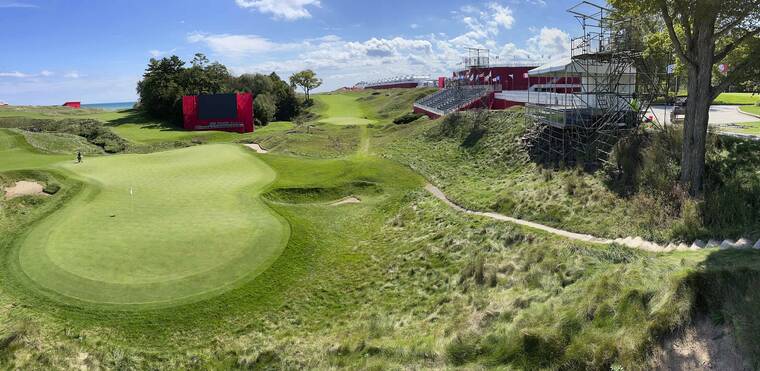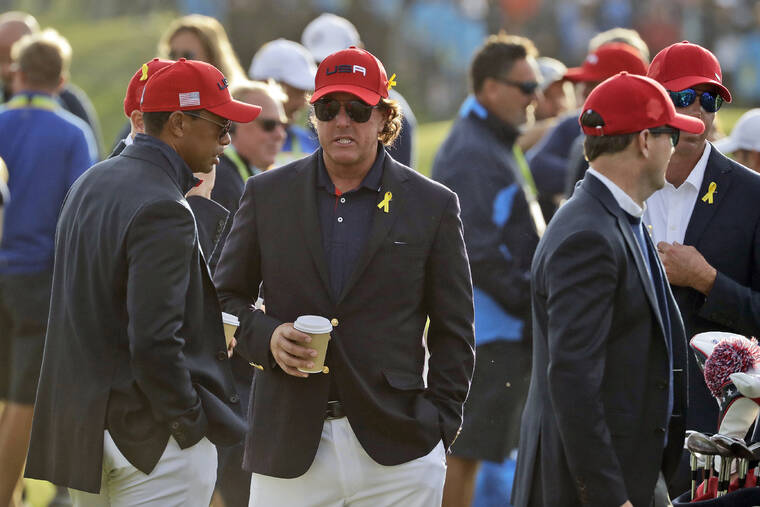No Tiger, No Phil. And maybe a US Ryder Cup win
Tiger Woods won’t be at Whistling Straits this week, for obvious reasons. Phil Mickelson will, but for the first time since 1995, he won’t hit a shot in the Ryder Cup.
The storyline in the Ryder Cup hasn’t changed, but the marquee players have — at least when it comes to the beleaguered U.S. team. Woods is still mending from a car accident, while Mickelson will end a streak of 12 straight Ryder Cups as a player to be a non-playing assistant captain for a team tasked with wrestling the cup back from Europe.
That may prove a bit of a disappointment for the tens of thousands who will swarm the rugged course on the edge of Lake Michigan to scream for the home team. The mere sight of Woods or Mickelson near a tee box is usually cause for wild celebration, especially as the day grows long and the alcohol flows.
Look a little closer, though, and it may not be such a bad thing for a U.S. team trying desperately to regain the cup on home soil. Because as talented as Woods and Mickelson are, they’ve been — for the most part — flops when it comes to the Ryder Cup.
No, they’re not entirely responsible for the Americans losing nine of the last 12 Ryder Cups and four of the last five. But as the leaders of many of those teams, they didn’t contribute much to them, either.
The losses over the years have been stunning enough, coming to European teams that on paper were never as talented as any American squad topped by Woods and Mickelson. Equally as stunning is the record of the two best American golfers of the last quarter-century.
While Mickelson holds the Ryder Cup record for most matches played (47), he also holds the record for most matches lost (22). Mickelson’s winning percentage is just 46% (7 ties), and his devotion to the team concept has been questioned on several occasions over the years.
Woods, meanwhile, last won a Ryder Cup match in 2010. He’s played in eight of them, and the last time he was on a winning team was when he was dominating everything in golf in 1999.
In his last Ryder Cup while reasonably healthy, Woods went 0-3-1 in 2012. He likely finished his Ryder Cup career with a 0-4 mark in France in 2018, where Europe romped to a win that was surprising if only because not much resistance was put up on the other side.
Just how bad is his overall record? A journeyman named J.B. Holmes has been on more winning Ryder Cup teams than Woods, whose Ryder Cup career will be remembered more for missed opportunities than great performances.
Why couldn’t Woods and Mickelson win big in the Ryder Cup when they’ve won big everywhere else? That’s a question that vexed Ryder Cup captains over the years who spent long restless nights trying to figure out how to match their talents to various teammates in the team matches.
They lost with teammates both good and bad. They lost in best ball and lost in alternate shot. They even lost in singles, most disastrously when Mickelson was beaten in 2002 on the final day at The Belfry by Phillip Price, then No. 119 in the world, as the U.S. lost by a point.
And those in golf remember well the disastrous pairing of the two in 2004 when they melted down almost before they reached the first tee. The idea, according to captain Hal Sutton, was to steamroll the Euros with the game’s top two players, but it didn’t take long for the plan to go horribly awry.
Woods and Mickelson lost their first best ball match, then more famously were beaten in alternate shot when Mickelson sliced a shot so far left that Woods briefly covered his eyes and ended up taking an unplayable in a 1-up loss.
Now both are out of the lineup — Mickelson for the first time since his Ryder Cup debut a quarter-century ago — and the U.S. brings a young but extremely talented team to Whistling Straits instead. While Woods remains home in Florida, Mickelson will be an assistant captain, tooling around in a golf cart and cheering his countrymen on.
The torch has been passed, and it won’t be returned. Mickelson is 50, and aside from his improbable win in the PGA Championship earlier this year, is past his competitive prime, while Woods was injured so badly in his car crash that he may never hit a shot that counts again.
Hard to believe it was 22 years ago that Woods and Mickelson were on the winning team at Brookline in a U.S. final day comeback so stirring that both probably saw lots of Ryder Cup glory in their future.
“I never knew how good it feels to win the Ryder Cup,” Woods said afterward.
Incredibly, he hasn’t had the feeling since.



